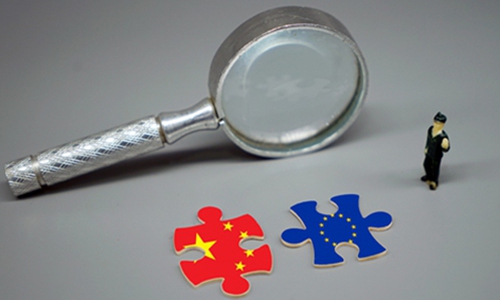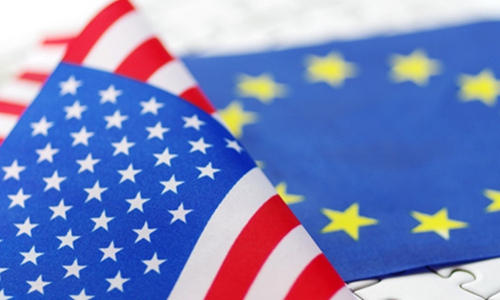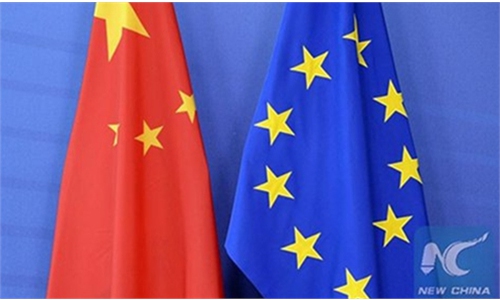
Photo: IC
Editor's Note:The European Union has gone in a different direction from the US in terms of relations with China. The bloc will not pick sides with the US or blindly follow suit to find fault with China. Why does the EU have so different stance from the US? What are Europe's concerns with regard to its relations with China? Daniel Gros (Gros), director of the Centre for European Policy Studies, shared his views with Global Times (GT) reporter Xu Hailin.
GT: China is not a security threat, said Josep Borrell, European Union foreign affairs chief, after his talk with Chinese State Councilor and Foreign Minister Wang Yi on June 8. During the talk, Borrell expressed the EU's high expectations for relations with China. One day before, NATO Secretary General Jens Stoltenberg said China is not "the new enemy or an adversary." Are the Europeans using such rhetoric to distance themselves from the US with regard to pursuing independent diplomacy and strategic autonomy?
Daniel: The representatives of the European institutions have little interest following slavishly the US position. There is one key difference between the US and the EU: China is putting the US position as No.1 in danger. The EU has not been positioned as No.1 to defend. The EU is usually content to be No.3.
Strategic autonomy is the new catchword in Brussels. But, apart from money and trade (and to some extent investment) the EU has no real competence in the key areas which count in diplomacy today, such as cyber security, AI, 5G, and so on. Individual member states thus pay lip service to the goal of EU strategic autonomy, but jealously defend their national autonomy (and frequently act at cross purpose).
GT: China and the US are engaging in ever increasing adversarial competition, while the EU and the US are haunted by various disputes. The EU does not want to be instrumentalized by one or the other. Will the bloc withstand pressures from the US and carry on seeking strategic autonomy?
Daniel: The transatlantic disputes are quarrels within a family. They would not represent a big problem, like in the past, if it were not for Trump and his erratic and abrasive style. Unreasonable pressure from the US to side with it against China might actually backfire by illustrating the value of EU strategic autonomy. So far, I see little sign that pressure from the US has led to a deterioration of EU-China relations.
GT: In your December 2019 article, you noted that as the EU seeks to achieve its geopolitical aims, the bloc "would have to abandon some of its core principles to go down this road." What role can China play in the EU's pursuit of higher political status?
Daniel: The Europeans have to get their act together if they want the EU to achieve a higher political status. Moreover, the EU in general does not want to emulate the US in mis-using economic levers of power for political or geopolitical aims. Given the complicated decision-making structures in the EU, it would actually be difficult to do so. China could help EU cohesion a little bit by supporting the EU in multilateral fora areas, such as WTO reform, climate change and by concluding the bilateral negotiations which are still pending (investment treaty and geographical indicators).
GT: Both Borrell and Stoltenberg have, on the one hand, expressed goodwill toward China while showing their cautiousness and concerns on the other. Why does Europe have such complicated sentiments toward China?
Daniel: Last year, the European Commission issued an important strategic document in which it described well these complicated sentiments toward China. In some areas the EU and China can cooperate (e.g. climate change, hopefully also WTO reform). The economic links are very strong, but are changing in nature. China and the EU used to be complementary: European machines against cheap Chinese goods. This is changing rapidly as China is moving up the value chains and produces higher quality goods with higher technological content. This has increased fear in Europe of Chinese competition in high-tech industries.
Moreover, in the past, European policymakers hoped that the differences in political regimes would diminish over time as China opened up and its population became increasingly well-educated and prosperous.
The ambivalence of Europe toward China has increased as the economic relationship is changing from complementarities to competitions. At the same time the degree of involvement of the state and the party in the economy has increased in China, creating a feeling that this competition is unfair. Recent events regarding Hong Kong have shown that the differences in political regimes are increasing instead of diminishing.
GT: The EU-China summit planned for September has been postponed. Although Germany still hopes it can commence later this year, some analysts believe Berlin can hardly coordinate the 27 EU member states for a summit consensus. What is the main disagreement about China within the bloc? Is the US a reason lurking behind the curtain?
Daniel: The US is not lurking behind the EU-China summit. One reason (apart from the ongoing uncertainties about COVID-19) was that too little progress has been achieved on the key economic issues being negotiated between the two sides (investment treaty and geographical indicators for some food products). On both these issues it is not just Germany which is disappointed, but most of the EU. It is unlikely that a future EU-summit can take place until these issues have been resolved.
GT: The Trump administration reportedly will withdraw about one-third of US troops stationed in Germany. As the US prefers a split Europe instead of an integrated one, will this be Washington's first move to disrupt the continent's landscape?
Daniel: For the time being there is no official US decision to withdraw troops from Germany. It is unlikely that this will happen quickly. The US military has some of its most valuable bases in Germany which are being used for its global operations, including the Middle East. It will be difficult for the US to maintain its capacity to intervene there and in other places without a strong presence in Europe. Some troops could be moved to Poland. But this would bring them much closer to Russian threats and would also be against the spirit of the agreements between NATO and Russia concluded after German unification. All in all, it is doubtful that a significant withdrawal of US troops from Germany will take place soon.



